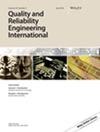考虑多应力耦合效应的加速度模型和基于非线性维纳过程的可靠性建模方法
IF 2.8
3区 工程技术
Q3 ENGINEERING, INDUSTRIAL
引用次数: 0
摘要
建立准确的加速降解模型对于确保获得精确的可靠性评估结果至关重要。遗憾的是,目前的加速降解试验往往缺乏用于研究多应力耦合现象的试验组。因此,在缺乏应力耦合信息数据的情况下,现有的多应力加速模型无法充分考虑应力耦合的影响。这种局限性会导致建立的模型不准确,最终影响可靠性评估的精度。为应对这一挑战,本文介绍了一种考虑应力耦合效应的多应力加速退化模型新建模方法。所提出的建模方法旨在提高多应力条件下的可靠性评估精度。在所提出的模型中,应力的主效应函数是在现有单应力加速模型的基础上确定的。首先通过多变量方差分析(MANOVA)检验耦合效应,然后通过相关分析从给定的候选函数中确定耦合效应函数的函数形式。然后,将耦合效应纳入维纳过程,建立多应力加速降解模型,并提出了结合最小二乘法(LSM)和差分进化算法(DEA)的两步估算方法。利用两组蒙特卡罗模拟实验数据验证了耦合效应测试方法、模型建立和参数估计方法的准确性和有效性。最后,通过实例证明了所提模型的优越性,为考虑应力耦合的多应力加速降解模型研究提供了可行的思路和技术支持。本文章由计算机程序翻译,如有差异,请以英文原文为准。
Acceleration model considering multi‐stress coupling effect and reliability modeling method based on nonlinear Wiener process
Establishing an accurate accelerated degradation model is paramount for ensuring precise reliability evaluation results. Unfortunately, current accelerated degradation tests often lack test groups for investigating multi‐stress coupled phenomena. Consequently, existing multi‐stress accelerated models fail to adequately consider the impact of stress coupling when data with stress coupling information is absent. This limitation leads to the development of inaccurate models, ultimately affecting the precision of reliability assessment. To address this challenge, this paper introduces a new modeling method for multi‐stress accelerated degradation models that takes into account stress coupling effects. The proposed modeling method aims to improve the accuracy of reliability assessment under multi‐stress conditions. In the proposed model, the main effect function of stress is determined based on existing single‐stress accelerated models. The coupling effect is first examined through the Multivariate Analysis of Variance (MANOVA), and then the functional form of the coupling effect function is determined from the given candidate functions through correlation analysis. Next, the coupling effect is incorporated into a Wiener process to establish a multi‐stress accelerated degradation model, and the two‐step estimation method combining Least Squares Method (LSM) and Differential Evolution Algorithm (DEA) is proposed. The accuracy and effectiveness of the coupling effect test method, model establishment, and parameter estimation method were validated using two Monte Carlo simulation experimental data sets. Finally, the superiority of the proposed model is demonstrated through examples, providing feasible ideas and technical support for the research on multi‐stress accelerated degradation modeling considering stress coupling.
求助全文
通过发布文献求助,成功后即可免费获取论文全文。
去求助
来源期刊
CiteScore
4.90
自引率
21.70%
发文量
181
审稿时长
6 months
期刊介绍:
Quality and Reliability Engineering International is a journal devoted to practical engineering aspects of quality and reliability. A refereed technical journal published eight times per year, it covers the development and practical application of existing theoretical methods, research and industrial practices. Articles in the journal will be concerned with case studies, tutorial-type reviews and also with applications of new or well-known theory to the solution of actual quality and reliability problems in engineering.
Papers describing the use of mathematical and statistical tools to solve real life industrial problems are encouraged, provided that the emphasis is placed on practical applications and demonstrated case studies.
The scope of the journal is intended to include components, physics of failure, equipment and systems from the fields of electronic, electrical, mechanical and systems engineering. The areas of communications, aerospace, automotive, railways, shipboard equipment, control engineering and consumer products are all covered by the journal.
Quality and reliability of hardware as well as software are covered. Papers on software engineering and its impact on product quality and reliability are encouraged. The journal will also cover the management of quality and reliability in the engineering industry.
Special issues on a variety of key topics are published every year and contribute to the enhancement of Quality and Reliability Engineering International as a major reference in its field.

 求助内容:
求助内容: 应助结果提醒方式:
应助结果提醒方式:


